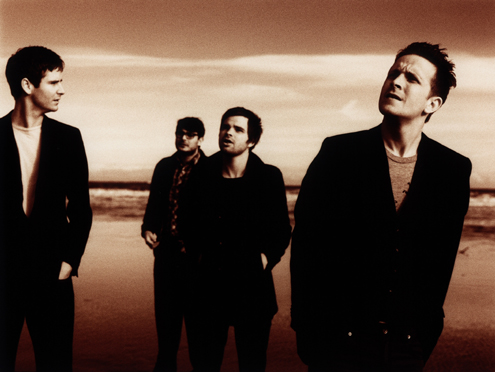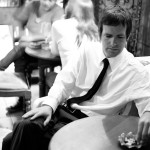
IT’S GETTING BETTER

It’s fair to say that the Futureheads are the buzz band of the moment in the UK. Which is both strange and silly, really, considering they’ve been around for nearly eight years and already got tagged a ‘Next Big Thing’ band a few short years ago, as they headlined major festivals and everyday gigs above such contemporaries as Bloc Party and the Kaiser Chiefs. Why the sudden resurgence in interest, then? While bands like the aforementioned BP and Chiefs soared to relative superstardom, the Futureheads never quite made it. Floundering somewhere between their peers and the legions of young bands who would inevitably cop their styles, the grossly-talented foursome undersold all expectations on their sophomore effort and ended up dropped by their label, 679, in 2006.
So here they are two years later: self-releasing their third record, This is Not the World, and finding its lead single, “The Beginning of the Twist,†A-listed on BBC Radio 1. Meanwhile, the British press is championing them as poster boys for a new business model in which bands control their own destinies. self-titled caught up with Dave Hyde (drums/vocals) and Jaff (bass/vocals) in a Brixton Academy dressing room hours before they were to headline a celebratory gig for the popular UK radio station, XFM.
![]()

self-titled: How did you guys go from being dropped by 679 to creating your own imprint (Nul Records)? Walk me through the process.
Jaff: Basically, once we parted ways [with 679], about three months after that we got the call from Jazz, our manager, and he was like, “Well, how about we just do it ourselves?” And at the beginning, we were just like, “Nah this is gritty. Who’s gonna pay our wages? How are we gonna afford a tour? Who’s gonna pay the crew?” All that type of stuff. And the, as he put forward a few plans, you know, he was like, “We could put up some cash to get you going and float a couple of tours and stuff–we’ll pay for the record to get made.” As soon as he said he’d pay for the album to be made, [Dave laughs] we said, “Yeah, let’s do that.” Because producers are expensive, you know? Like, it took relatively little to do it, but we still didn’t have that money lying about. So it probably took about three or four months to get up and running, but we’ve kinda got a label manager now and stuff, so:
Dave: So it’s all good.
Jaff: We had a couple of tours left to do that we were gonna do anyway, so we did those. They were all breaking even or making money, so we didn’t have to worry about the profit/loss thing, didn’t need a record company to do it. We had Christmas off, got together in January; [guitarist/vocalist] Barry [Hyde] was like, “I’ve got a couple of songs.†We did them and it went really well, so we were definitely gonna make another album. Because I mean at that point it really wasn’t certain that we would, you know? We hadn’t had the best of years.
Well, that’s what I was going to ask next. Was there ever a moment when you considered splitting up?
Jaff: We never really talked about it, did we?
Dave: I don’t think we would’ve split up. I think (Barry) was having a hard time at that point; Baz was definitely pretty down. Which was kinda getting in the way of him writing, so I suppose it could’ve ended up with us splittin’ up.
Jaff: Yeah, so, basically, we spent about the first part of 2007, three or four months, getting about 10 songs together? Nine songs, really. We demoed them ourselves and then got Youth to produce the album, who Big Life manages as well.
Yeah, I was gonna say, who is this guy?
Jaff: Youth was in Killing Joke!
Dave: He’s a druid!
Jaff: He’s a druid.
Dave: He’s an actual druid.
Really?
Dave: He’s a total stoner.
You must’ve gotten along with him grandly.
Dave: He was great. We did it out in Spain, in the beautiful sunshine.
Jaff: Yeah, it was this amazing lake near Grenada. Youth’s done loads of albums; like he did, um, White Flag for Dido … Dave: [laughing] You know, a great album.
Jaff: He did Crowded House, Together Alone.
You guys fit nicely into that group.
Jaff: I know, right? He did that Crowded House album, he did Urban Hymns for the Verve.
Dave: He’s a big guy.
Jaff: He’s done loads of like, big selling records. He once came to one of our practices and was like, “How about you try changing that around, and this around.” He didn’t write anything but he was kinda like, “From an outsider’s point of view, this sounds like the chorus, and this sounds like the verse, and you’ve got it the wrong way around.†And you listen to his ideas, and you’re like, “Whoa, he’s right.”
Was that a different process than it was with past producers?
Jaff: Yeah, we wouldn’t normally let anyone change our songs. Which is fine, as well, but I think you just gotta let it go to let it come back a little bit. You know, like the second record we made entirely on our own, wouldn’t listen to the producer [Ben Hillier]. He just recorded it; had a few sonic ideas. But apart from that, we did all the lyrics, all the harmonies and all the everything, you know, ourselves. But with Youth, he’d say, “Right, ok, [let’s do a] song a day.†We’d get through it, he’d get the arrangement, then he’d keep the guitar parts and the bassline, do a few guitar overdubs, lead vocal, double track it, get the harmonies on, go home at night, done. Don’t listen to it again for two weeks. It’s pretty crazy. It’s how the Beatles used to do it. It’s the best way.
Dave: Yeah, it was a good way to do it. It was a lot faster.
How long did it take you?
Jaff: Sixteen days; 21 songs.
Dave: Yeah. Twenty songs in 16 days, [spread over] five weeks.
Jaff: Three weeks.
Dave: That’s not including weekends.
Jaff: Ah yes.
Those were the days off with the druid, right? So, how are you getting distribution in America?
Jaff: I think in the US we’re gonna use a company called Red? That’s just getting sorted out this week actually.
“The Beginning of the Twist”
[youtube=http://www.youtube.com/watch?v=d7eOGf0mnYg]
And what about touring in America?
Jaff: We’ve got one scheduled for September at the minute. Just TBC dates–no actual cities or anything yet.
You headlining?
Dave: Aye.
Jaff: Yeah, I don’t really agree with doing support tours that much. They’re not really very much fun–not unless it’s some huge band and we can try to steal their audience. Most of the touring we’ve done has been on our own. You get a better representation of where you are, really, and there’s less guesswork. It’s all fair and well to play this huge venue, and say “I’ve played this huge venue,†but if nobody watches you when you’re there …
Dave: [laughing] “We were AT that venue … ”
Yeah, it’s certainly better for the psyche of a band to play in really enthusiastic small clubs as opposed to like, empty, big spaces.
Dave: Exactly. Totally.
So, you guys are very vocal about this new business model in everything I’ve been reading about you. But what would you say to bands that don’t have the advantage of a [management team like] Big Life behind them?
Jaff: I know what you mean–it’s pretty tricky.
Dave: Um, I would recommend that you sign to a major. [lots of laughter]
Jaff: Take the money! Take the money and run, I’ll say.
Dave: Let them rip you off.
Jaff: Get in there, get them to spend 900 grand on you and then leave. They’ll drop you and you don’t owe them anything. But you’ve still got all these fans! It’s pretty set! No, um, it’s pretty tough. When you’re first starting out, you’ve just got to do loads of gigs and see how it happens for you, really. Get MySpace up and running. Look at Arctic Monkeys. I mean, obviously they had Domino behind them, but it was their Internet following that got them to where they are. So you can always go down that avenue. And if major record companies are gonna go in for you, you just gotta get a really good lawyer. Make sure you don’t get totally shafted on the deal. But I mean, even though we had a good lawyer, we got totally shafted on the [679] deal. In general, people don’t give you big money unless you’re gonna make big money back.
Well, there are those new 360 deals [like the Live Nation ones with Madonna and U2]. What are your thoughts on those?
Jaff: That’s pretty much what we’re doing, in a way. It’s just that we’re not doing it with a record company; we’re doing it on our own.
Right, with a manager. So, when you went into the studio, how many songs did you have?
Dave: About nine. We used to do a song, and then to entertain Youth …
Jaff: [laughing] … which we all wanted to do to start with.
Dave: We would do a jam at the end of the night, and record it.
Jaff: We did loads of jams, or whatever. His interpretation of “jam‖well, what if a band says to you, “jam?†What would it mean to you?
Um, play an unstructured, freeform song?
Dave: Yes, yes:.
Jaff: Well, in Youth’s head, ‘jam’ is stealing a chorus from somebody else’s song, a verse from somebody else’s song.
Dave: Very BIG songs.
Jaff: “Jam ‘Take Me Out’ by Franz Ferdinand, mixed with ‘You Look Good on the Dancefloor’ by the Arctic Monkeys, and then just claim that we wrote it.†I’d say, EVERY man–90-percent of the English speaking world–have heard both those songs. But we’d take an old Joy Division riff, and take a Deadboys riff and then like, jam them for a bit, and change them.
What would you use this for? A B-side?
Jaff: Yeah.
Dave: Yeah, just b-sides.
Jaff: B-sides and just a, a bit of creation. I’d totally rewrite a vocal to go over the top, or like, a drumbeat from an old ’50s song, and then like, a punk riff, changed slightly. Change a couple of chords around, and then Barry would write a new vocal for it.
“Skip to the End”
[youtube=http://www.youtube.com/watch?v=2sDXv5FcInQ]
Are you guys like, sitting around waiting to see how many music nerds figure out where the parts are all from?
Jaff: [laughs] Yeah.
Dave: There is a Gary Glitter drumbeat on the album [imitates drumbeat].
Jaff: Yeah there is.
Is there also a Gary Glitter affinity for pedophilia?
Jaff and Dave: No. [lots of laughter]
There were quite a few moments on this record where I found myself waiting for “Skip to the End†or “Return of the Berserker†to kick in.
Jaff: [smiling] Yeah.
Sonically, this stuff seems to be a natural progression from those songs. Was that intentional? Do you see this record as a development of those ideas?
Jaff: I think we see it as a development, yeah. We wanted this record to be a bit more direct, I think. The second record, looking back on it, was a little–ethereal, maybe? Do you know what I mean?
I love that record.
Jaff: Oh no, I do as well. I think we all do. But I think a lot of peoples’ criticisms of it–and I think we have to take them into account–is that it’s a little vague maybe? You know, sometimes it’s a little pastoral? Like, radio songs that never were on the radio. [lots of laughter] We wanted to take that aggression from the first record and put it with the songs of the second album, and make a record of structured songs with choruses that everyone could relate to. And I think like, lyrically, this third record is better. I think people can relate to the lyrics a lot more.
Dave: It’s just like, this new record is really happy. We were out in the sun; it was really beautiful surroundings. When we did the second one it was a bleak fucking countryside in Yorkshire. It’s a headphone album, the second one, I think. You listen to it on headphones and you’ll get it better. The third record, you just crank it up on the ghettoblaster.
But to be perfectly honest, when I first heard this one, I was a little disappointed in a way, because to me, a lot of it sounded …
Jaff: Similar.
Alike, yeah. Which you know, could be said for the first record too.
Jaff: Right, in a different way.
Yeah, but in listening to this third one more–listening to the lyrics closely and just spending more time with it–I fell in love. I mean, I read in an interview that you refer to the last record as making your fifth or sixth record second, and to me, that totally makes sense because this record does seem like it should’ve …
Jaff: Followed the first album.
Yeah.
Jaff: I just think this one’s like the first album, more coherent. The first album is pretty crazy; I think you know it is. And that’s why I love it.
Dave: The third album is a lot more traditional, like structurally. Not like the first. This one’s just like, really straightforward–intro, verse, chorus, verse, dual chorus, outro.
Do you think that had something to do with–you were saying that the radio push behind this record seems to be the most …
Dave: Successful?
Driven, yeah. Successful thus far. It seems a bit strange considering that the second record was maybe more accessible immediately.
Dave: Right.
Jaff: I dunno, I think it’s odd. I mean, over here, everyone we played this record to would say that the third album is more accessible than the first or the second.
Really?
Jaff: It would definitely fit on the radio here a lot more straight away.
Well, the single is amazing.
Dave: It was easy this time around! I dunno how, but it was.
Jaff: It was just all a laugh! Youth was just like, “Yeah whatever, I’m not gonna really take this that seriously. That sounds really good, that doesn’t sound so good, you may as well do it again:â€
Dave: And then he’d just get stoned.
Jaff: “Yeah, uh, just do that second verse again?†[simulates taking a puff] “Whoooo.†[laughing]
Would you work with him again?
Dave: Yeah.
Jaff: I think we’re planning on it.
“Worry About It Later”
[youtube=http://www.youtube.com/watch?v=6aZQtfkoII8]
This might be a bit of a reach, but it seems like quite a lot of the lyrics on this record could have double meaning, where they could apply to [everyday] life as well as the state of the music industry. Was that an intentional thing?
Jaff: Well, I think you’re kinda asking the wrong two guys. [laughing]
I know.
Jaff: Well, people have asked that question when talking about “the Twist.†Barry says that song is about mental illness and the way that he felt about it. But when I didn’t know he had said that, I took it very differently. To be kind of like, the allegorical relationship between the breakdown of a girl and boy’s relationship and the breakdown of our record company, with like, “the beginning of the twist†being the way that we were gonna start doing things differently and the way that the whole music industry was changing as a whole.
Dave: I know for sure that it’s about him being at a breaking point. Kinda cracking. I think that’s what “Twist’s†about. I don’t think it’s about the industry. There might be in a few of the others; I don’t know.
Jaff: I think the reason the single was such a good choice to go first is because of the title: “Beginning of the Twist.†Because of the way that things have started to change.
On the subject of the single, you guys made a really big push for your fans to go out and buy this so that they could get independent music on the charts. Were you satisfied with–what was it, 20?
Jaff: 20.
Dave: Yeah, we were all really chuffed.
Jaff: It was really good! When we did the first album, “Hounds of Love†came in at like, No. 8. You know, we sold almost as many singles last week that we did of “Hounds?â€
Really?
Jaff: Yeah, it’s just the download thing. You have to sell a lot more to get higher.
Dave: If you see who was in the top 20 when we were in the top 20, it’s unbelievable.
Who was it?
Dave: Just huuuuge artists.
Jaff: We went in at 16 in the midweeks, which obviously doesn’t really count. The second day we were still there, third day we were still there, then obviously you don’t hear anymore because its Saturday, everyones gone home from work; and then we were overtaken on the last day. It was like, Girls Aloud, Westlife, Kylie Minogue. It’s like, if were competing with those people, in that world, we’re never gonna win. We won’t even try to beat them.
Dave: We didn’t spend a penny on advertising, so to get to 20 was very good.
Jaff: Ten thousand people bought that single and that was just off our website, so it was a pretty good effort from us, I think!
Dave: We’re over the moon.
How important is chart position anyway?
Dave: Not particularly. [laughter]
Jaff: We don’t really care, that’s the thing. But it’s like, it’s important for us to make a statement you know? Like, we’re back. We wanna get Radio 1’s attention, because they really played it. It’s nice for them to see, because over here downloads are directly linked to airplay. The more airplay you get, the more people download your music. So we needed to get a lot of downloads, otherwise Radio 1 would’ve said, “Well, there’s no point in playing you because no one likes you.†We got the third most plays on Radio 1 out of the whole country. They’ve really supported us.
How did that happen?? I mean, that’s great, but what the fuck??
Dave: Yeah, exactly!
Ok, well this DIY ethic is great for the UK, but a large part of that is because the UK is quite small. What are your thoughts on America?
Jaff: Well it’s funny, isn’t it? Because we don’t really know how it works over there, but I think it’s quite hard to get onto the radio stations and stuff without a bit of a buy on. Like, “We’ve got Green Day so you’ve got to play the Futureheads to get the Green Day single,†and all that. Obviously we won’t have that, so it’s going to be pretty tricky. But you know, I think you’ve gotta kinda scale things down when you’re not on a major in America. A band sells 300,000 and no one knows who they are anyway.
Well not really anymore. They’ll sell like, 30,000.
Dave: Ugh.
Jaff: Yeah, fair enough.
Dave: I dunno. Not many bands do break America. I can’t think of any band. I mean, well, James Blunt did it. That sums it all up.


